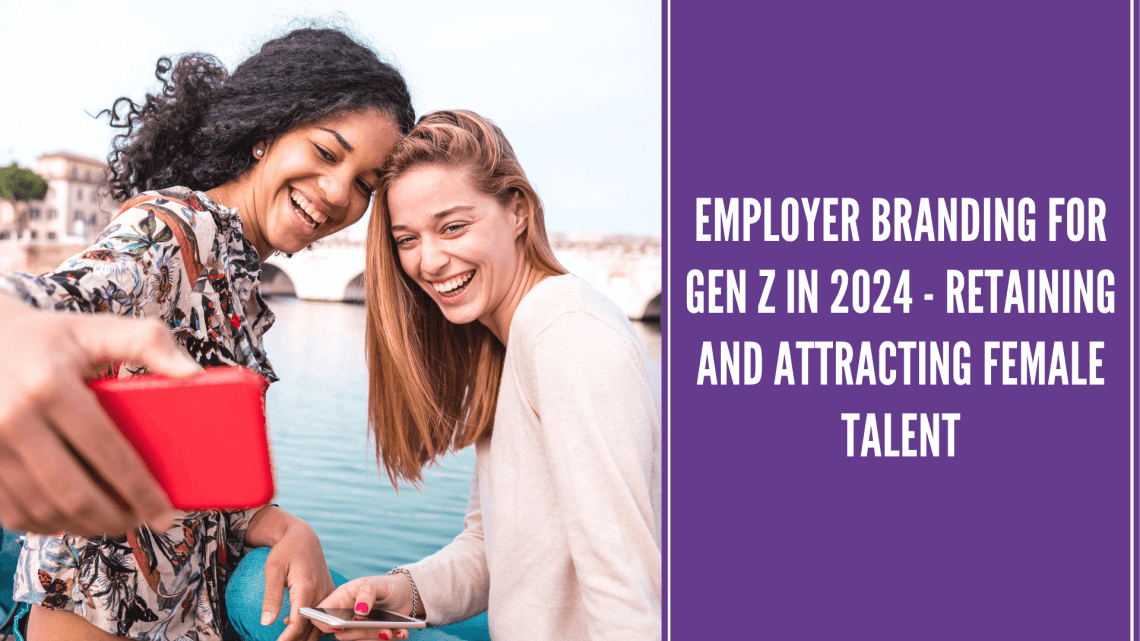- Understanding who Gen Z is:
- Tailoring Employer Branding for Female Talent:
- 1. Flexible Work Policies:
- 2. Mentorship and Leadership Programs:
- 3. Diverse Representation:
- 4. Social Media Engagement:
- 5. Professional Development Opportunities:
- 6. WomenTech Network Circles
- Conclusion:

In the dynamic landscape of the modern workplace, the task of attracting and retaining top talent has evolved significantly, with the rise of Generation Z entering the workforce. Born between the mid-1990s and early 2010s, Gen Z is characterized by its digital fluency, diverse perspectives, and a keen desire for purpose-driven work. In this article, we explore the intricacies of employer branding tailored for Gen Z and delve into strategies for retaining and attracting female talent in the year 2024.
Understanding who Gen Z is:
As the first fully digital generation, Gen Z brings unique expectations to the workplace. According to a LinkedIn survey, Gen Z leads the generations, with 72% having either left or contemplated leaving a job due to the absence of a viable flexible work policy offered by their employer. They value diversity, inclusion, and a sense of purpose in their professional lives. To resonate with this generation, organizations need to align their employer branding strategies with these core values. Embracing transparency, social responsibility, and a commitment to employee well-being are crucial elements that appeal to Gen Z candidates.
Tailoring Employer Branding for Female Talent:
In 2024, the focus on diversity and inclusion extends beyond just attracting women to the workforce—it's about creating environments that empower and retain female professionals. Companies need to go beyond mere rhetoric and actively implement policies and initiatives that address the unique needs and aspirations of women in the workplace.
1. Flexible Work Policies:
Offering flexible work arrangements is not just a perk but a necessity.
McKinsey reports that 77% of Generation Z place a high priority on achieving work-life balance. In a world where work-life balance is highly valued, Gen Z and female professionals alike seek flexibility. Organizations can consider implementing flexible hours, remote work options, or compressed work weeks to accommodate diverse lifestyles and personal responsibilities.
2. Mentorship and Leadership Programs:
Creating mentorship and leadership programs specifically designed for women is essential. These programs provide guidance, support, and opportunities for skill development. By fostering a culture of mentorship and actively promoting women into leadership roles, organizations signal their commitment to gender equality.
3. Diverse Representation:
Gen Z and women alike are drawn to organizations that showcase diverse leadership teams. Companies need to actively work towards breaking down gender barriers and promoting diversity at all levels. Representation matters, and a diverse leadership team serves as a testament to the organization's commitment to inclusivity.
4. Social Media Engagement:
Gen Z is highly engaged on social media platforms, making them powerful channels for employer branding. According to Insense and Morning Consult, 76% of Gen Z actively engage on Instagram, while 68% use TikTok, 67% are on Snapchat, and nearly half use Facebook (49%) and Twitter (47%). Organizations can leverage these platforms to showcase their commitment to diversity, share employee stories, and highlight initiatives that resonate with Gen Z values. For female talent, platforms like LinkedIn can be particularly effective for networking and professional development.
5. Professional Development Opportunities:
Gen Z is known for its appetite for continuous learning. Offering professional development opportunities, mentorship programs, and access to resources that foster skill enhancement is crucial. Employers can partner with educational institutions, provide access to online courses, support certifications, and leverage platforms like WomenTech Network's professional membership and mentoring platform to demonstrate a commitment to employee growth.
6. WomenTech Network Circles
Creating and supporting a WomenTech Network Circle can provide a sense of community for female professionals. These are intimate gatherings for women in the tech industry, offering a casual and supportive environment for diverse discussions and activities
Circles provide a platform for women to discuss topics like personal branding, leadership skills, imposter syndrome, work-life balance and more. These groups offer a platform for networking, sharing experiences, and advocating for positive change within the organization.
Conclusion:
In a world where inclusivity is not just a buzzword but a business imperative, organizations must adapt their employer branding strategies to align with the values of Generation Z and address the specific needs of female professionals. By embracing transparency, fostering diversity, and implementing targeted initiatives, companies can create workplaces that not only attract top talent but also nurture and retain it.
As we navigate the workforce landscape of 2024, the key to success lies in understanding and responding to the evolving expectations of both Gen Z and female professionals. Whether through innovative policies, mentorship programs, or social media engagement, organizations that prioritize diversity and inclusivity will undoubtedly thrive in the competitive talent landscape of the future.






